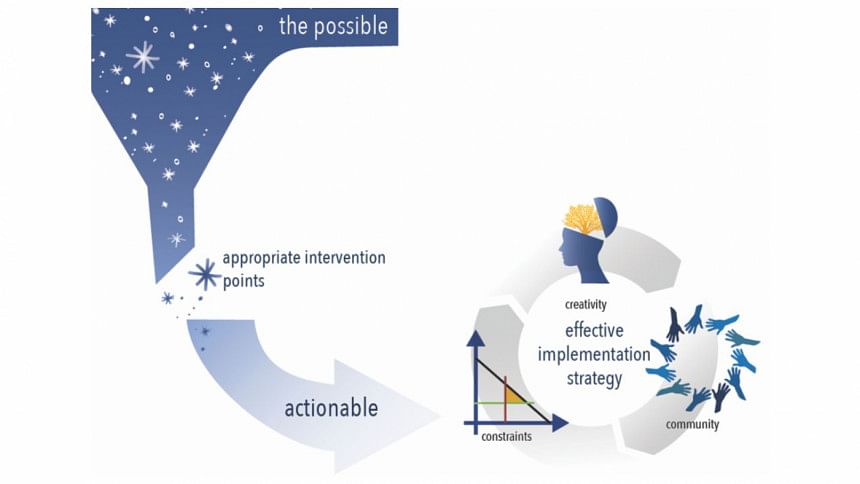Possible to Actionable

The people of Bangladesh have been playing football for over 100 years. But they have not produced a globally competitive football team. There is water everywhere, but there is not a single Olympic medalist swimmer from Bangladesh. Yet, they have a respectable national cricket team. While it is possible that Bangladesh could have produced a FIFA World Cup team or nurtured an outstanding swimmer or two, some possibilities don't make it to reality. However, some possibilities – like the successful cricket team - do crystalise into action.
What makes something move from the world of seemingly infinite possibilities to actionable reality?
Unmistakable mega trends are shaping our world: intensity of population growth; issues of climate change; speed of globalisation; and the over-utilisation of natural resources have already started creating constraints on our planet. We can debate the nature and implications of those constraints and how they manifest across domains – for example in water, climate and health - but no matter what the future holds, these constraints continue to create uncertainty, add ambiguity to planning, and create contentious competition among differing ideas, values and priorities.
Change and uncertainty are inevitable. The pace and nature of change has accelerated at a rate that we have never experienced before. These social and technological changes and innovations are shaping policies, changing the nature of politics, and redefining the way we live our lives.
In an uncertain world, anything is possible. However, not everything happens. Of all possible events, only a few will actually happen with significant consequences. How do we know which few important things will happen and when? How do we plan and prepare so that we can act accordingly when those few significant things happen? More importantly, can we identify and influence what may happen, given the resources and constraints we have? How do we seize (or create) the opportunity to make an impact?
How do we decide what to do when options are many, uncertainty is large and consensus is difficult to achieve? Many of these decisions are complex - because processes, actors and institutions are interconnected and interdependent – making a range of solutions possible. But not all possible decisions are actionable.
As an illustration, we show two examples of possible to actionable solutions. First, mobile phone call was made in 1946 by researchers from Bell Labs in the USA, but the impractically large size of the equipment combined with extremely limited bandwidth and supporting infrastructure made widespread adoption virtually impossible. In 1973, Motorola produced a battery powered, handheld mobile phone, but it wasn't until digital cellular networks emerged in the 1990s that mobile phone technology expanded to its current massive adoption. Cell phones are currently everywhere throughout the developing world. This enables other services; for example, cell phones help farmers get the best prices for their crops by eliminating the "middle man". In essence, intervention and implementation strategies for the mobile phone in the developing world has provided scalable implementation across socio-economic groups, created services that benefit the bottom of the pyramid, and has produced macro-scale impact.
The second example: prior to the1960s, diarrhea was one of the leading causes of childhood mortality. An international team started working together in 1962 to develop an extraordinary actionable solution - oral rehydration therapy (ORT) - consisting of sugar, salt, and water. The simplicity of ORT combined with an effective implementation strategy by BRAC created a widely practiced, actionable method to save children's lives throughout Bangladesh and the world.
A closer look at the history of large scale adoption of mobile phones and ORT reveals that their development and implementation were not a smooth, linear progression of innovation but were fraught with the struggle for power, legitimacy, and control. Yet, the enormous success of mobile phone or ORT shows how we may move from possible to actionable ideas.
The writer is Director of Water Diplomacy, Professor of Civil and Environmental Engineering and Professor of Water Diplomacy at the Fletcher School of Law and Diplomacy at Tufts University, USA.
Twitter: @ShafikIslam

 For all latest news, follow The Daily Star's Google News channel.
For all latest news, follow The Daily Star's Google News channel. 



Comments